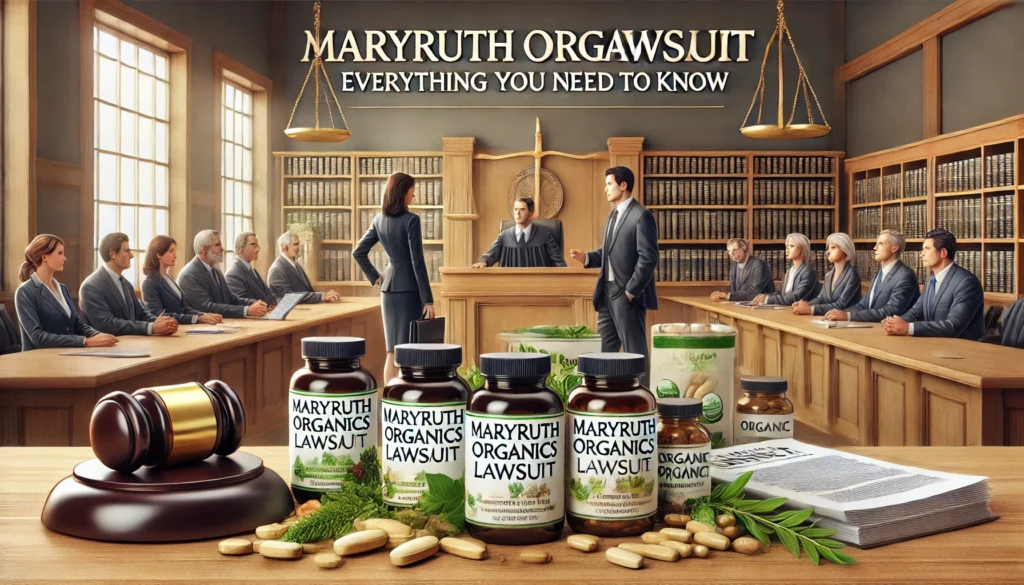What is Mary Ruth Organics?
Overview of the Company and Its Product Range
Mary Ruth Organics is a well-known company that produces a variety of health products including vitamins, supplements, and other nutritional aids. Their focus on natural, plant-based ingredients has made them popular among consumers looking for clean-label products. The company offers liquid vitamins, probiotics, minerals, and multivitamins designed to improve overall wellness. Many of their products are marketed as being non-GMO, vegan, and gluten-free, which appeals to people looking for healthier alternatives to traditional supplements.
Discuss the Company’s Reputation Before the Lawsuit
Before the Mary Ruth Organics lawsuit, the company had built a strong reputation in the health and wellness industry. Customers trusted the brand for its commitment to using organic ingredients and its promise of transparency in product labeling. With a loyal customer base, Mary Ruth Organics was viewed as a trustworthy provider of high-quality, natural supplements. The company’s reputation for delivering effective, clean products earned them a positive image, especially among health-conscious individuals. However, the lawsuit has since raised questions about some of these claims.
Details of the Lawsuit Against Mary Ruth Organics
Specific Allegations Made in the Lawsuit
The Mary Ruth Organics lawsuit involves claims that the company may have engaged in misleading advertising and incorrect product labeling. The main allegations focus on whether the company’s products truly meet the health benefits and ingredient standards that are advertised. Plaintiffs argue that some products may not deliver the promised results or contain the exact ingredients listed on the labels.
Is it Related to Product Quality, Labeling, or Misleading Claims?
The lawsuit is primarily related to issues of misleading claims and labeling. Consumers have alleged that Mary Ruth Organics’ labeling might have overstated certain benefits or included ingredients that were not clearly disclosed. This raises concerns about the overall quality and transparency of the products.
Who Filed the Lawsuit and Why?
The lawsuit was filed by a group of consumers who claim that they were misled by the company’s marketing and product information. They believe they were purchasing products that did not meet the advertised promises, leading them to seek compensation for their financial losses and to hold Mary Ruth Organics accountable for its advertising practices.
What Products Are Involved in the Mary Ruth Organics Lawsuit?
List of Products Mentioned in the Lawsuit
The Mary Ruth Organics lawsuit may involve specific products from their popular range of vitamins and supplements, although the exact products would be mentioned in the legal filings. These products are marketed as natural and organic, but the lawsuit suggests that some of them may not meet the advertised standards. The products likely include liquid vitamins, probiotics, and multivitamins that have been questioned in terms of labeling accuracy or advertised benefits.
Health or Safety Concerns Related to These Products
While the lawsuit may not directly claim serious health risks, it raises concerns about the accuracy of product labels and whether the supplements provide the benefits they promise. If the claims are true, consumers might not be receiving the nutritional value they expect, which could affect those relying on these products for specific health needs.
Legal Claims Made in the Mary Ruth Organics Lawsuit
Legal Basis for the Claims
The legal claims in the Mary Ruth Organics lawsuit likely include violations of consumer protection laws, such as false advertising and misrepresentation. These laws are designed to protect consumers from misleading information, especially when it comes to health products. The plaintiffs claim that Mary Ruth Organics may have overstated the benefits of its products or provided inaccurate labeling.
Specific Violations or Misrepresentations
The lawsuit could allege that Mary Ruth Organics misrepresented the ingredients, quality, or effectiveness of its supplements. For example, the lawsuit may claim that certain products do not contain the promised amounts of vitamins or nutrients, or that their advertised health benefits are not supported by scientific evidence. These accusations suggest that the company may have breached truth-in-advertising laws.
Impact of the Lawsuit on Mary Ruth Organics
Effect on the Company’s Brand Image
The Mary Ruth Organics lawsuit has likely damaged the company’s once-strong brand image. As a company that markets itself as transparent and committed to organic, high-quality products, these legal issues can lead to loss of consumer trust. Even if the company denies the claims, the negative publicity surrounding the lawsuit can cause some customers to question the reliability of their products.
Recalls, Product Changes, or Company Statements
In response to the lawsuit, Mary Ruth Organics may have issued public statements defending their practices or announcing investigations into the claims. Depending on the outcome, the company might also be forced to recall products or make changes to their product labels to ensure compliance with regulations. The company could also promise reforms to regain consumer confidence.
Public Response or Consumer Feedback
The lawsuit may have led to a variety of consumer reactions, with some customers choosing to stop purchasing Mary Ruth Organics products until the case is resolved. Online reviews and social media discussions could reveal how much trust consumers have lost in the brand, while some loyal customers may continue to support the company, depending on how they handle the situation.
Possible Outcomes of the Mary Ruth Organics Lawsuit
Legal Penalties or Financial Settlements
The potential outcomes of the Mary Ruth Organics lawsuit could include financial settlements paid to the affected consumers if the company is found guilty of false advertising or mislabeling. The company may also face legal penalties such as fines for violating consumer protection laws. Additionally, there may be court-ordered changes in how the company markets and labels its products.
Long-Term Effects on the Company
In the long term, the lawsuit may lead to regulatory changes or stricter industry standards for Mary Ruth Organics. This could include improved transparency in product labeling, additional testing of supplements, and greater scrutiny from health and consumer agencies. The lawsuit may also push the company to overhaul its marketing strategies and implement reforms to regain consumer trust.
Consumer Reactions and Responses to the Lawsuit
Customer Reactions to the News
When the news of the Mary Ruth Organics lawsuit became public, customers may have responded with concern and skepticism. Some may feel betrayed by the company, especially if they have relied on its products for health reasons. Negative reviews and customer complaints might increase, particularly if consumers feel misled by the company’s advertising.
Changes in Consumer Trust or Purchasing Patterns
As a result of the lawsuit, there could be a decline in consumer trust for Mary Ruth Organics. Some customers may choose to stop buying the company’s products altogether, while others may wait for the legal outcome before making purchasing decisions. Additionally, customers may turn to alternative brands that they perceive as more trustworthy, which could lead to a significant shift in the company’s market share.
Legal Precedents: Other Supplement Companies and Lawsuits
Similar Cases in the Supplement Industry
Several supplement companies have faced lawsuits similar to the Mary Ruth Organics lawsuit. For example, companies like GNC and Herbalife were involved in lawsuits that questioned the accuracy of their product labels and marketing claims. These cases often centered around issues like false advertising, misleading health benefits, or failure to disclose certain ingredients.
How Those Lawsuits Concluded
In many cases, these lawsuits ended in financial settlements, where the companies had to pay compensation to consumers or make changes to their product labels and marketing strategies. For example, Herbalife agreed to pay millions in settlements and reform their business practices. These cases have had significant impacts on the industry, pushing companies toward greater transparency and stricter adherence to consumer protection laws.
How to Stay Informed About the Mary Ruth Organics Lawsuit
Keeping Updated on the Lawsuit
Consumers interested in the progress of the Mary Ruth Organics lawsuit can stay informed by following reliable news outlets, checking official legal filings, and visiting the company’s website for any public statements. Legal databases like PACER and websites that track lawsuits provide updates on court hearings and other developments. Social media and health forums may also share insights and consumer experiences.
Advice for Concerned Customers
If customers are concerned about products from Mary Ruth Organics, they can contact the company directly for information about product returns or refunds. Consumers should also keep receipts or documentation of purchases if they wish to join any class-action lawsuits that may arise. Staying informed about the lawsuit’s outcome will help them understand their rights and options.
What This Lawsuit Means for the Supplement Industry
Broader Implications for Transparency and Accountability
The Mary Ruth Organics lawsuit highlights the growing importance of transparency and accountability in the supplement industry. As consumer demand for natural and organic products increases, companies must ensure that their marketing claims are accurate and supported by scientific evidence. This lawsuit could push the industry to adopt stricter standards for labeling and advertising.
Influence on Future Regulations
If the lawsuit leads to a significant settlement or court ruling, it may encourage regulatory agencies like the FDA to introduce new regulations that hold supplement companies to higher standards. This could mean more frequent inspections, tougher advertising rules, and stricter penalties for companies that fail to meet compliance standards.
Conclusion
The Mary Ruth Organics lawsuit is an important case that could impact not only the company but also the supplement industry as a whole. As the lawsuit unfolds, consumers and the industry are watching closely to see how issues of transparency and product claims will be addressed. The outcome may set a precedent for future legal actions and regulatory changes in the health and wellness sector.
FAQs
1. What is the current status of the lawsuit?
The lawsuit is still ongoing, with court hearings and legal proceedings expected to determine the outcome. Consumers can follow updates through legal channels and news outlets.
2. Should consumers stop using Mary Ruth Organics products?
Until the lawsuit is resolved, consumers can decide whether to continue using the products based on their comfort level. Checking with the company for any product recalls or statements may help.
3. How can consumers seek compensation if they were affected?
Consumers who feel they were misled by product claims may be eligible to join any class-action lawsuit that emerges. Consulting a legal professional or following court developments will help determine compensation options.
If Should you wish to read more, head to our blog page.

